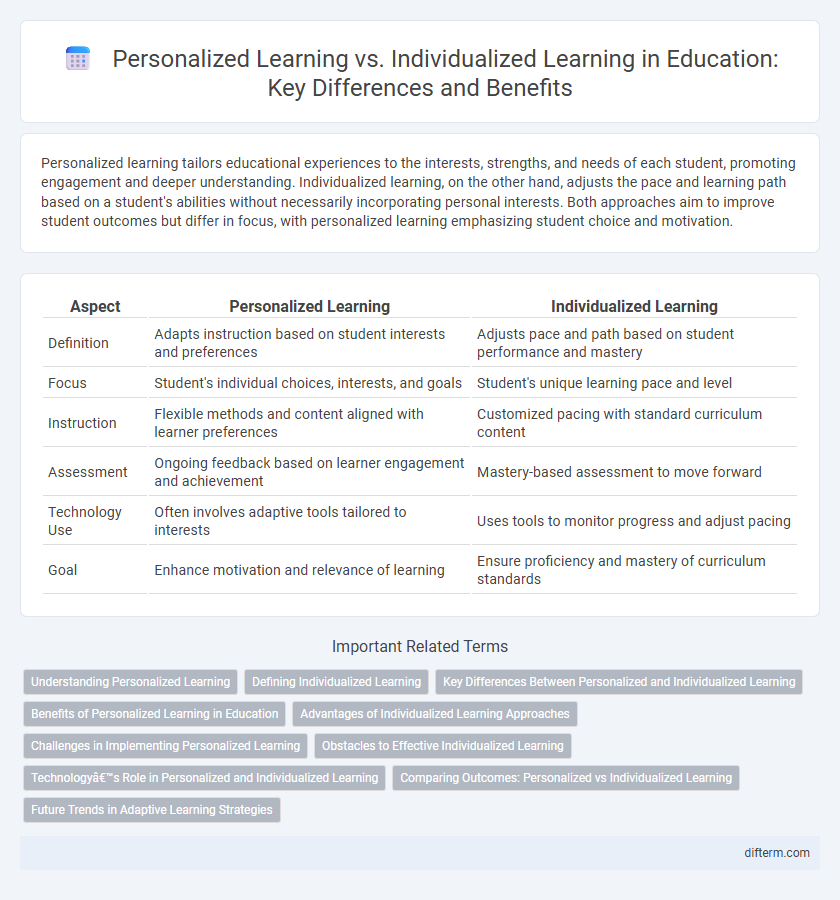Personalized learning tailors educational experiences to the interests, strengths, and needs of each student, promoting engagement and deeper understanding. Individualized learning, on the other hand, adjusts the pace and learning path based on a student's abilities without necessarily incorporating personal interests. Both approaches aim to improve student outcomes but differ in focus, with personalized learning emphasizing student choice and motivation.
Table of Comparison
| Aspect | Personalized Learning | Individualized Learning |
|---|---|---|
| Definition | Adapts instruction based on student interests and preferences | Adjusts pace and path based on student performance and mastery |
| Focus | Student's individual choices, interests, and goals | Student's unique learning pace and level |
| Instruction | Flexible methods and content aligned with learner preferences | Customized pacing with standard curriculum content |
| Assessment | Ongoing feedback based on learner engagement and achievement | Mastery-based assessment to move forward |
| Technology Use | Often involves adaptive tools tailored to interests | Uses tools to monitor progress and adjust pacing |
| Goal | Enhance motivation and relevance of learning | Ensure proficiency and mastery of curriculum standards |
Understanding Personalized Learning
Personalized learning tailors educational experiences to students' interests, needs, and preferred learning styles, fostering engagement through adaptive content and flexible pacing. Unlike individualized learning, which emphasizes customizing instruction based primarily on students' abilities, personalized learning integrates social-emotional factors and student agency for a holistic approach. Implementing personalized learning strategies improves academic outcomes by enhancing motivation and accommodating diverse learning profiles in K-12 and higher education settings.
Defining Individualized Learning
Individualized learning tailors educational experiences to each student's unique skills, pace, and interests, allowing for customized content and instruction methods. This approach emphasizes adapting curriculum goals and timelines to fit individual needs rather than a one-size-fits-all model. The goal is to maximize student engagement and mastery by recognizing distinct learning profiles within the classroom setting.
Key Differences Between Personalized and Individualized Learning
Personalized learning tailors educational experiences based on students' interests, strengths, and learning preferences to boost engagement and motivation. Individualized learning adjusts pacing and instructional methods specifically according to each student's unique needs and skill levels, emphasizing mastery of content. The key difference lies in personalized learning's focus on personal relevance and choice, whereas individualized learning concentrates on customized pacing and skill development.
Benefits of Personalized Learning in Education
Personalized learning enhances student engagement by tailoring instructional strategies and content to individual interests, strengths, and learning styles, fostering deeper understanding and motivation. It supports differentiated pacing, allowing learners to progress according to their mastery levels, which improves retention and academic outcomes. Integrating technology in personalized learning creates dynamic feedback loops, enabling educators to adapt resources in real-time and meet diverse student needs effectively.
Advantages of Individualized Learning Approaches
Individualized learning approaches tailor educational experiences to each student's unique pace, preferences, and skill levels, promoting greater academic growth and self-confidence. These methods facilitate targeted interventions, allowing educators to address specific learning gaps effectively and enhance overall student engagement. By accommodating diverse learning needs, individualized learning fosters autonomy and motivation, leading to improved retention and mastery of subject matter.
Challenges in Implementing Personalized Learning
Implementing personalized learning faces significant challenges including the need for advanced technology platforms to analyze student data and tailor instruction effectively. Educators often struggle with balancing standardized curriculum requirements and adapting lessons to diverse learning styles, resulting in inconsistent student engagement. Furthermore, the high cost of training teachers and developing personalized content limits widespread adoption in many educational institutions.
Obstacles to Effective Individualized Learning
Obstacles to effective individualized learning include insufficient teacher training on adaptive technologies and the lack of scalable resources tailored to diverse student needs. Limited classroom time restricts the ability to continuously assess and adjust learning plans, hindering personalized pacing. Inadequate access to data analytics tools further impedes the identification of specific learner challenges essential for targeted interventions.
Technology’s Role in Personalized and Individualized Learning
Technology enhances personalized learning by adapting content to students' unique preferences and learning styles through AI-driven platforms that analyze real-time data. Individualized learning benefits from technology by providing customized pacing and targeted interventions, using adaptive software to address specific skill gaps. Digital tools such as learning management systems and interactive simulations facilitate both models, enabling scalable, student-centered education tailored to diverse needs.
Comparing Outcomes: Personalized vs Individualized Learning
Personalized learning tailors educational experiences to students' interests, strengths, and needs, enhancing engagement and motivation, which often leads to improved academic outcomes. Individualized learning focuses on pacing and instructional strategies that accommodate each student's unique learning speed and style, promoting mastery of foundational skills. Studies indicate personalized learning increases higher-order thinking and problem-solving abilities, while individualized learning effectively supports skill proficiency and knowledge retention.
Future Trends in Adaptive Learning Strategies
Personalized learning harnesses AI-driven analytics to tailor educational content based on students' unique learning styles and interests, while individualized learning adjusts pacing and goals to meet specific academic needs. Future trends in adaptive learning strategies emphasize integrating real-time data and predictive algorithms to enhance customization and improve learner engagement. Advancements in neuro-education technologies are enabling deeper insights into cognitive processes, fostering more effective personalized learning environments.
personalized learning vs individualized learning Infographic

 difterm.com
difterm.com